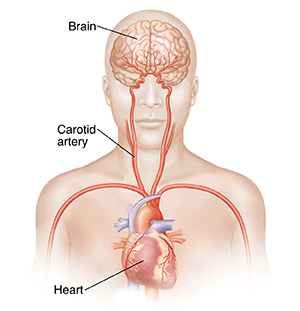Causes of Syncope
Syncope (fainting) has many causes. Sometimes it's not serious. In other cases, it's a sign of a heart problem. But treatment can help

When syncope is not serious
Most causes of syncope are not serious and may include:
-
Strong feelings, such as anxiety or fear. A nerve signal may briefly change your heart rate and lower your blood pressure too much.
-
Standing for too long. Standing may cause blood to pool in your legs. When this happens, your brain may not get all the blood it needs.
-
Standing up too fast. Your blood pressure may not adjust fast enough to changes in posture and may drop too low. Certain medicines can also cause this problem. Examples of medicines that can cause a drop in blood pressure include diuretics, blood pressure medicines, and medicines for chest pain.
-
Reaction to normal body functions. When you go to the bathroom, have gastrointestinal discomfort, nausea, or pain, your heart may have a natural reflex to slow down and lower blood pressure. This can result in syncope. This may also follow exercise, eating, laughter, weight lifting, or playing musical instruments like the trumpet or trombone.
When heart trouble causes syncope
A heart problem can lower the amount of oxygen-rich blood that gets to the brain. Heart trouble can be serious and even life threatening if not treated:
-
A slow heart rate. Electrical signals tell the chambers of the heart when to pump. But the signals may be slowed or blocked (heart block) as they travel on the heart’s electrical pathways. This can be caused by aging, scarred heart tissue, or damage from heart disease. When the heart rate slows, not enough blood is pumped.
-
A fast heart rate. Some things can make the heart race. For instance, a heart attack can create abnormal electrical signals. These signals can make the heart suddenly beat very fast. The heart pumps before the chambers can fill with blood. So less blood gets to the brain and other parts of the body. Illegal drugs, certain medicines, heart disease, or an inherited condition can also cause this.
-
A heart valve problem. Blood travels through the chambers of the heart as it pumps. Heart valves open and close to help move blood in the right direction. But a hardened or scarred valve may not open or close fully. As a result, less blood is pumped through the heart to the brain and body. Most often, syncope occurs when a person's aortic valve is narrowed and he or she does strenuous activity.
-
A heart muscle problem. Some people develop a thickened heart muscle that blocks blood flow out of the heart to the body. This is called hypertrophic cardiomyopathy. Being dehydrated and having this condition can raise the risk for syncope.
Whatever the cause of syncope, it's important to see your healthcare provider. You may need to be seen by a cardiologist, neurologist, or an ear, nose, and throat specialist. Don't drive, operate heavy machinery, or do activities in which you could fall and injure yourself if you have syncope and have not been evaluated.
Note about concussion
If you had an injury to the head, it is possible that you could have a concussion (mild brain injury). Symptoms of a concussion can show up later. For this reason, be alert for symptoms of concussion once you’re home.
Seek emergency medical care if you have any of the symptoms below over the next hours to days:
- Headache
- Nausea or vomiting
- Dizziness
- Sensitivity to light or noise
- Unusual sleepiness or grogginess
- Trouble falling asleep
- Personality changes
- Vision changes
- Memory loss
- Confusion
- Trouble walking or clumsiness
- Loss of consciousness (even for a short time)
- Inability to be awakened
During the time period that you’re watching for concussion symptoms:
- Don’t drink alcohol or use sedatives or medicines that make you sleepy.
- Don’t drive or operate machinery.
- Don’t do anything strenuous, such as heavy lifting or straining.
- Limit tasks that require concentration. This includes reading, watching TV, using a smartphone or computer, and playing video games.
- Don’t return to sports, exercise, or other activity that could result in another injury.
Ask your healthcare provider when you can safely resume these activities.
© 2000-2025 The StayWell Company, LLC. All rights reserved. This information is not intended as a substitute for professional medical care. Always follow your healthcare professional's instructions.